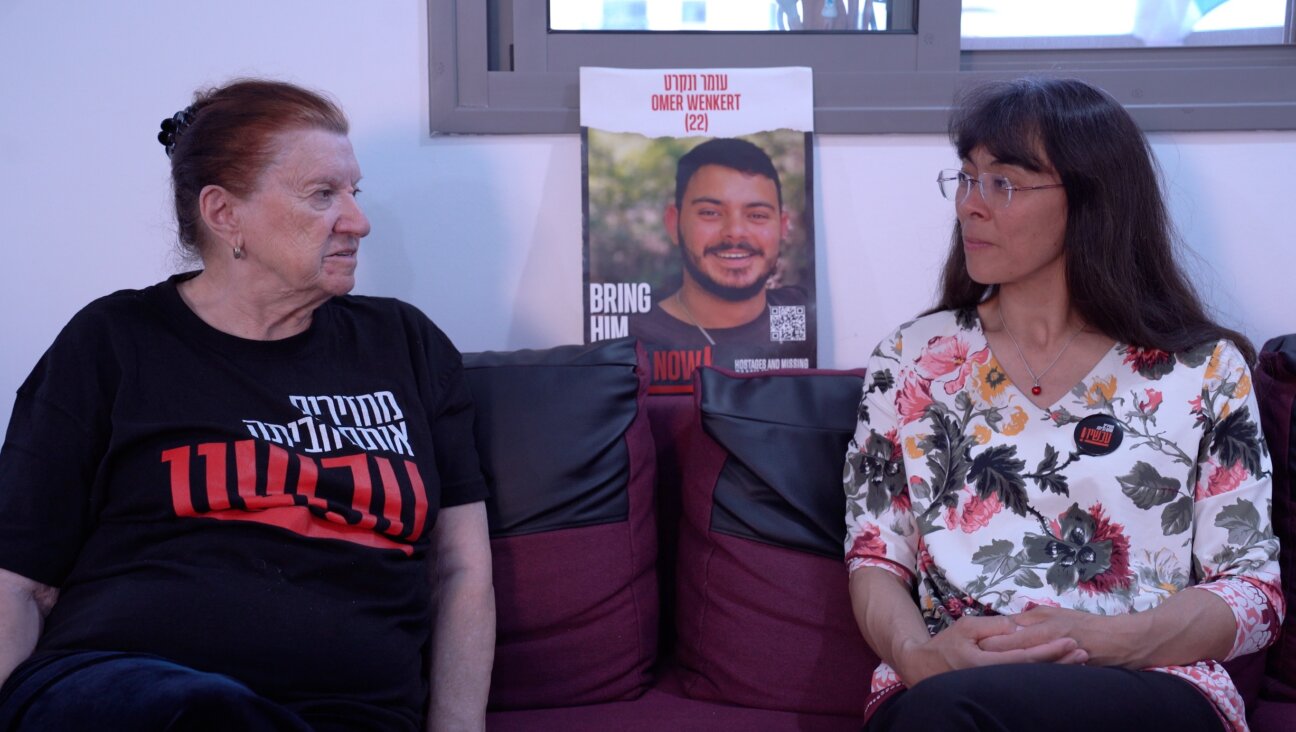Israel Blames Attacks on Syria-Iran Axis
Israel is pointing to this week’s Hezbollah raid as proof of its contention that Syria and Iran are leading a coordinated terror front, which includes Hamas and Hezbollah.
After two Israeli soldiers were abducted Wednesday by Hezbollah militants operating out of Lebanon, Israeli Prime Minister Ehud Olmert issued a warning to Beirut, as well as to Damascus. “Syria has proven that it is a terrorist government in nature,” Olmert said. “It is a government that supports terrorism and encourages murderous actions of terror organizations in and out of Syria. Obviously, there will be an appropriate deployment against the government of Syria.”
Israeli officials and Jewish organizations had already been blaming Syria for the kidnapping of another Israeli soldier, Gilad Shalit, who was abducted June 25 by Palestinian militants operating out of Gaza. With the Hezbollah raid, Jerusalem and pro-Israel forces are also ratcheting up their condemnations of Iran.
“We now in the Middle East have an axis of terror and hatred comprising Iran, Syria, Hamas and Hezbollah, which is trying to attack Israel and prevent peace in the area,” said Israel’s consul general in New York, Arye Mekel.
Israel asserts that the kidnappings were the result of a deliberate strategy crafted by Syria and Iran, and implemented by Hamas and Hezbollah, to stoke violence on the Palestinian front. Mekel tracked the coordination back to a little-noticed January 2006 visit by Iranian President Mahmoud Ahmadinejad to Damascus, during which he met Syrian President Bashar Assad, as well as the leaders of Hamas and Hezbollah, and two other terrorist groups: Palestinian Islamic Jihad and the Popular Front for the Liberation of Palestine-General Command. At a joint press conference, Ahmadinejad and Assad vowed to fight the plots of “world arrogance and Zionism” in Lebanon and called for “continued resistance” to Israeli “occupation of the holy Islamic lands.”
According to Mekel, this “terror summit” served to coordinate anti-Israeli activities just as Hamas won the Palestinian Authority elections. “We know [Hamas leader Khaled] Mashal ordered the kidnapping of Shalit,” Mekel said, “and we know Syria and Iran have a vested interest in keeping the Palestinian issue alive, and use the Hamas government as a beachhead.”
Jewish groups held rallies Monday in front of the Syrian diplomatic missions in New York and Washington to demand Shalit’s release. They accused the regime of Syrian President Bashar Assad of allowing the alleged mastermind of the kidnapping, Hamas leader Khaled Mashal, to operate freely in Damascus.
Though the Bush administration condemned Syria and urged it to arrest Mashal, two leading congressional critics of the Assad regime, including Rep. Ileana Ros-Lehtinen, a Florida Republican who chairs the House’s subcommittee on the Middle East and Central Asia, say that Washington has displayed too much restraint in dealing with Syria.
As Israeli forces prepared to enter Southern Lebanon following the abduction by Hezbollah, Secretary of State Condoleezza Rice condemned the kidnappings and urged Syria, which is widely believed to have sway over Hezbollah, “to use its influence to support a positive outcome.” She also appeared to send a message to Israel, however, stating that “all sides must act with restraint to resolve this incident peacefully and to protect innocent life and civilian infrastructure.”
In Wednesday’s raid, Hezbollah militiamen killed seven Israeli soldiers on the Lebanese border, in addition to abducting two others. The attack took place during massive Hezbollah shelling against frontier positions and inside the Western Galilee, which also wounded several Israeli civilians.
Mashal held a press conference in a Damascus hotel on Monday that was broadcast on Al Jazeera and Syrian state television, during which he rejected American and Israeli accusations against Syria as desperate attempts to export Israel’s crisis and thanked Assad for his support for the Palestinian cause. Both Mashal and Hezbollah leader Hassan Nasrallah called for prisoner exchanges to end the current crisis, fueling Israeli claims that the two terrorist groups were coordinating their activities.
The Hamas spokesman in Lebanon, Osama Hamdan, reportedly said that the Hezbollah operation would help Hamas. He did not say whether the two groups had coordinated the attacks, but suggested that there would be “coordination and an understanding” as the crisis continued to unfold.
Observers saw Mashal’s press conference as an indication of Syria’s belief that it had weathered the diplomatic storm caused by the February 2005 slaying of former Lebanese premier Rafiq Hariri, which prompted a United Nations probe that produced circumstantial evidence of involvement at the highest levels of the Syrian government and eventually forced Assad to withdraw his forces from Lebanon.
In addition to the seeming drop in international pressure relating to the Hariri killing, American criticism of Syria’s role in allowing insurgents and weapons to flow into Western Iraq has drastically ebbed in recent months.
“The relatively lower recent level of noise about Syria emanating from Washington [and from Paris] likely is an additional reason for Israeli officials to raise their own noise level,” said Paul Pillar, who until early this year was the top Middle East analyst at the CIA.
The shift, according to Pillar, was based on an assessment that Damascus is “doing most of what it can do to control the Iraqi border” and that talking publicly about the Hariri probe could discourage Damascus’ cooperation with U.N. investigators; he also described the shift as a byproduct of the numerous foreign-policy issues facing the administration, including the unending violence in Iraq and the nuclear showdowns with Iran and North Korea.
“Thoughtful and knowledgeable Israeli officials may realize all that too, but still see it in Israel’s interests to do what they can to keep Syria on the diplomatic front burner,” said Pillar, now a visiting professor at Georgetown University.
Walid Phares, a senior fellow with the Foundation for the Defense of Democracies, said that “Iran and Syria wanted to shift the attention from their issues — nukes for Tehran and Lebanon for Damascus — back to a Palestinian-Israeli problem in the region.”
“It is most likely that the latest flare-up against Israel was requested by Iran and Syria to drag Israel into a confrontation, give Hamas stature and weaken the Palestinian Authority president,” Mahmoud Abbas, Phares said.
In contrast to those pointing a finger at Damascus, some observers see the Israeli diplomatic offensive against Syria as a way to maintain Jerusalem’s standing in Washington. Joshua Landis, an assistant professor of history at Oklahoma University currently based in Damascus, contends that Israel is seeking to win more leeway for its actions in the Palestinian territories by underlining that it is not dealing with the “Palestinians” but with an international “axis of evil” including Hamas, Hezbollah, Syria and Iran.
“The greatest danger for Israel is that the ‘West’ and most importantly Washington, will begin to see Israel as a mill stone around Washington’s neck,” wrote Landis, who runs the Syrian Comment blog, in an email to the Forward. “Now that the pet theory of the neocons — that the road to Jerusalem goes through Baghdad — has proven wrong, many in Washington are beginning to come back to the notion that what happens in Israel and Palestine is important to Washington’s image in the Middle East and its success in the war on terror. That is why it is all important for [Israel] to keep the focus off ‘occupation’ and ‘legitimate democratic leaders’ where the Palestinians will try to put it, and on terror, dictators, and terrorists, where Israel will put it. By focusing on Mashal and not [Palestinian Prime Minister and fellow Hamas leader Ismail] Haniya, on Damascus and not the P.A., and on terrorism and not occupation, [Israel] can remind the U.S. that the two are in the same camp and fighting the same war.”
Pro-Israel lawmakers were starting to step up their own efforts to focus negative attention on Syria. Ros-Lehtinen, the Florida Republican, and Rep. Eliot Engel, a New York Democrat, were planning to write President Bush this week to urge him to enforce the full range of sanctions against Damascus set forth by the Syrian Accountability and Lebanese Sovereignty Restoration Act. The administration has only implemented a few measures since the bill was passed into law in December 2003.
“I don’t know why the administration is not moving,” Engel told the Forward. “I had asked Secretary of State Condoleezza Rice several times, both publicly and privately, why we are not doing it. Her answer has always been that we want to do it in conjunction with other countries. Well, if there was ever a time to do it, this is it. Now is the time.”
Analysts agree that the diplomatic situation of the Assad regime had improved in the last several months. While the U.N. probe is still ongoing and could still implicate the head of the Syrian regime, its outspoken first chief prosecutor, Detlev Mehlis from Germany, has been replaced by low-key Serge Brammerz and the probe is taking place largely out of public view. In addition, the spate of political assassinations in Lebanon has abated since the killing of a lawmaker in December.
Finally, the Bush administration, which repeatedly assailed Damascus for failing to seal its border with Iraq last year, has lessened its criticism because of evidence that Syria was being more cooperative, according to congressional sources and Pillar, the former CIA officer.
Some pro-Israel advocates surmise in private that Washington’s softening toward Damascus could further be explained by back-channel discussions over cooperation in Iraq and on terrorism. The administration has been reluctant to implement the provisions of the Syria Accountability Act, ordering a ban on Syrian imports but avoiding more drastic steps such as prohibiting American companies from doing business with Syria and limiting movement of Syrian diplomats in the United States.

I hope you appreciated this article. Before you go, I’d like to ask you to please support the Forward’s award-winning journalism this Passover.
In this age of misinformation, our work is needed like never before. We report on the news that matters most to American Jews, driven by truth, not ideology.
At a time when newsrooms are closing or cutting back, the Forward has removed its paywall. That means for the first time in our 126-year history, Forward journalism is free to everyone, everywhere. With an ongoing war, rising antisemitism, and a flood of disinformation that may affect the upcoming election, we believe that free and open access to Jewish journalism is imperative.
Readers like you make it all possible. Right now, we’re in the middle of our Passover Pledge Drive and we need 500 people to step up and make a gift to sustain our trustworthy, independent journalism.
Make a gift of any size and become a Forward member today. You’ll support our mission to tell the American Jewish story fully and fairly.
— Rachel Fishman Feddersen, Publisher and CEO
Join our mission to tell the Jewish story fully and fairly.
Our Goal: 500 gifts during our Passover Pledge Drive!























